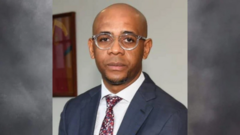The sex tape scandal that has emerged in Equatorial Guinea, involving senior civil servant Baltasar Ebang Engonga, is raising eyebrows across Central Africa. With estimates suggesting there are between 150 and 400 leaked videos of Engonga, often termed 'Bello', engaged with various women, the incident has been described as shocking and scandalous both within the nation and internationally.
Engonga, the nephew of President Teodoro Obiang Nguema, is under investigation for embezzling state funds—a claim he has yet to comment on—having been arrested almost concurrently with the leak of these videos. The timing of the scandal, juxtaposed with his potential candidacy for the presidency, has led many to suspect foul play, especially given the opaque nature of Equatorial Guinea’s political landscape, marked by repression of dissent and limited press freedoms.
The explicit videos reportedly include prominent women in the country, highlighting connections to the elite political circles. Observers suggest that this development may have been orchestrated by political rivals within the government, possibly as a tactic to tarnish Engonga’s reputation before he could make a move for higher power. Vice-President Teodoro Obiang Mangue, who shared familial ties and political aspirations high in the ranks, has taken a visible stance against the video leak, ordering telecommunications companies to rein in the distribution of these clips.
Equatorial Guinea, under President Obiang since 1979, has been criticized globally for its human rights abuses and economic mismanagement. The wealth division is stark; while a handful enjoys opulence, millions live in poverty. This affluence juxtaposed with widespread hardship has made the political scene fraught with conflict, where scandal and political intrigue often collide.
Activists argue that this incident may serve dual purposes: not only tarnishing Engonga's image but also providing the government with a justification to reinforce social media restrictions, a common practice when information threatens to expose the truth of the ruling elite's failings. Such suppression of dissent has been observed repeatedly, particularly in connection with public discontent or protests.
Despite efforts to stall the spread of the videos, they have gained traction online, captivating a wider audience and escalating search interests in Equatorial Guinea. This moment, while seemingly a personal scandal, has broader implications for the country's political trajectory and highlights the systemic issues plaguing the nation. Many observers believe that the fallout may signal the end of an era, provoking questions about the future of governance and accountability in Equatorial Guinea, echoing frustrations among those advocating for reform.
Though Engonga's scandal has attracted significant media attention, it may just be one symptom of the deeper corruption and malfeasance permeating the country's political framework, which continues to leave ordinary citizens grappling with fundamental challenges in their daily lives.
In the wake of the scandal, calls for transparency, reform, and accountability for all levels of government have intensified, as Equatorial Guinea stands at a crossroads, caught between legacy and the potential for change.
Engonga, the nephew of President Teodoro Obiang Nguema, is under investigation for embezzling state funds—a claim he has yet to comment on—having been arrested almost concurrently with the leak of these videos. The timing of the scandal, juxtaposed with his potential candidacy for the presidency, has led many to suspect foul play, especially given the opaque nature of Equatorial Guinea’s political landscape, marked by repression of dissent and limited press freedoms.
The explicit videos reportedly include prominent women in the country, highlighting connections to the elite political circles. Observers suggest that this development may have been orchestrated by political rivals within the government, possibly as a tactic to tarnish Engonga’s reputation before he could make a move for higher power. Vice-President Teodoro Obiang Mangue, who shared familial ties and political aspirations high in the ranks, has taken a visible stance against the video leak, ordering telecommunications companies to rein in the distribution of these clips.
Equatorial Guinea, under President Obiang since 1979, has been criticized globally for its human rights abuses and economic mismanagement. The wealth division is stark; while a handful enjoys opulence, millions live in poverty. This affluence juxtaposed with widespread hardship has made the political scene fraught with conflict, where scandal and political intrigue often collide.
Activists argue that this incident may serve dual purposes: not only tarnishing Engonga's image but also providing the government with a justification to reinforce social media restrictions, a common practice when information threatens to expose the truth of the ruling elite's failings. Such suppression of dissent has been observed repeatedly, particularly in connection with public discontent or protests.
Despite efforts to stall the spread of the videos, they have gained traction online, captivating a wider audience and escalating search interests in Equatorial Guinea. This moment, while seemingly a personal scandal, has broader implications for the country's political trajectory and highlights the systemic issues plaguing the nation. Many observers believe that the fallout may signal the end of an era, provoking questions about the future of governance and accountability in Equatorial Guinea, echoing frustrations among those advocating for reform.
Though Engonga's scandal has attracted significant media attention, it may just be one symptom of the deeper corruption and malfeasance permeating the country's political framework, which continues to leave ordinary citizens grappling with fundamental challenges in their daily lives.
In the wake of the scandal, calls for transparency, reform, and accountability for all levels of government have intensified, as Equatorial Guinea stands at a crossroads, caught between legacy and the potential for change.





















